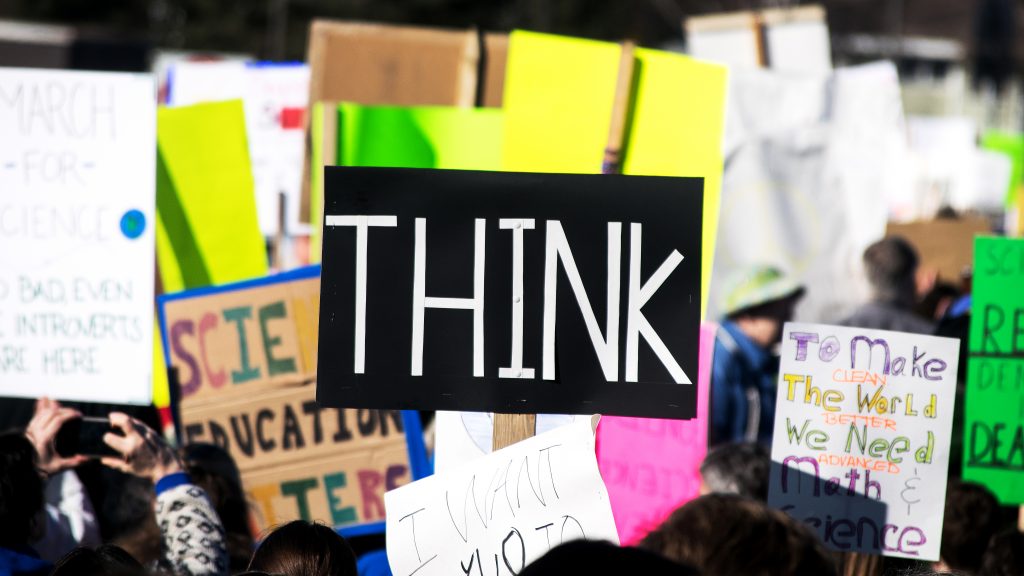- Scientists’ concerns go unheard one year in to Trump presidency - December 6, 2017
Scientists have been worried about Trump’s disregard for science since the campaign. As we approach the one year anniversary of the inauguration, Trump does little to calm their fears.
By Kael Knight

On April 22, tens of thousands of people took to the streets globally in the movement known as the March for Science. According to the movement’s website, the marches were in protest of cuts to funding and the repression of scientific research by the new presidential administration, and aimed to increase public awareness and demonstrate popular demand for “evidence-based policy.’ According to Susan Todd, University of Alaska Professor and an influential organizer of the demonstration, conditions did improve for a period of time, increasing public awareness and empowering those who would stand up for science. However, Todd also described these improvements as temporary. Now we are nearing the one year anniversary of the removal and concealment of data that inspired the marches, and scientific research is no better off.
Todd and Christa Mulder, also a UAF professor, were the primary organizers for the March for Science in Fairbanks, an event that drew over 1,000 demonstrators.
“Fear motivated me”
“Fear motivated me,’ said Todd, citing her concern that the United States would withdraw from the 2015 Paris Agreement – which it did on June 1st as NBC News reported. “Fear that the Trump administration would label any scientific findings it didn’t like as fake news. Fear that the environmental safeguards that we struggled to create over the past 40 years would be dismantled.’
According to Todd we can already see the result of this dismissal of vital information and resources. “We are abandoning renewable energy projects in favor of fossil fuels. The fox is literally in charge of the hen house.’
Hiding the Facts
Shortly after Trump’s inauguration, the White House website was overhauled, relegating climate change to a small section expressing the new administration’s intent to reverse Obama-era policies limiting carbon emissions The New York Times reported.
Anonymous employees of the Environmental Protection Agency told The Washington Post that on Jan 24, four days after Trump’s inauguration, the administration instructed EPA Officials to remove all climate change information from agency websites. Among the removed websites were pages from the EPA and Interior Department providing literature on the specific threats global warming posed for the southwestern portion of the United States. The Federal Supplier Greenhouse Gas Management Scorecard, a site created by the Obama Administration meant to keep firms with federal contracts in the public eye concerning their carbon footprint, was archived within a week of Trump’s inauguration.
In response to criticism from the scientific community of these actions the administration released a statement saying “Administration-specific content that was posted to state.gov during President Obama’s tenure was archived.’
The .gov domain – the official domain of the United States government that passes into the care of a new administration with every new president – does undergo changes regularly as different administrations come and go, however, the administration has not explained why the removal of scientific data is important or even beneficial, and fails to calm concerns about the trend of information suppression and denial of scientific facts.
This trend has continued over the past year. The Guardian reported that staff in U.S. Department of Agriculture were banned from using the term “climate change’ and instead were told to replace the term with “weather extremes’ in August. Recently, the EPA has announced it’s abandonment of the Obama-era Clean Power Plan, reported The New York Times. The new administration has gone as far as to stop researchers from studying the impact mining has on the health of those nearby. Enforcement of environmental laws have fallen off by 60 percent under the new administration according to the Environmental Integrity Project.
These actions have motivated many to speak up in defense of science. Once the administration began changing the EPA website, the Environmental Data and Government Initiative, an international nonprofit scientific watch dog organization, began to record every noticeable change to the site, and compiled them in a report available to the public. The EDGI was not available for comment.
The administration’s actions have also inspired reaction in Fairbanks. “I was concerned, and that concern led me to participate in a way I would normally not,’ said Cross – Cultural Studies Professor Michael Koskey, who spoke at the march on the value of social sciences and their integration with the other scientific subgroups. Koskey went on to explain why he spoke last year, and how his fears had not diminished in the time since.
“I agreed to [speak] because of what seems to me to be a time of government denial and disregard for reasonable science and other research, and the attempted politicization of research. A disregard for science that doesn’t support or provide benefit to Trump’s political and personal desires is what [the administration’s actions] represents.’
Todd is in talks with others in the area to plan the 2018 March for Science. “The challenge is to keep up the fight. [the March for Science] made us feel empowered,’ She said. “But we can’t let our guard down. We must remain active and keep fighting for evidence based policies and evidence based journalism, which is totally under attack from the Alt Right. We need to organize regular actions to keep these things at the top of the agenda.’
As for the future, Todd quoted former President Obama, saying “Show up, dive in, stay at it.’
